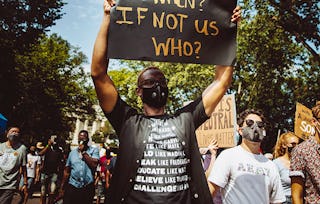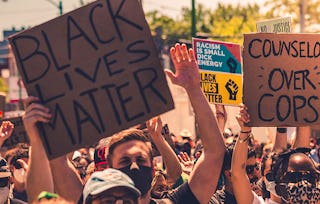Anti-Racism II is an intermediate course between Anti-Racism I and Anti-Racism III, focusing on the topic of race, racism, and strategies regarding how to be an anti-racist. Anti-Racism II is for anyone who has previously taken Anti-Racism I, or who has basic knowledge of the racial issues plaguing the United States, and globally.

Anti-Racism II
Ends soon: Gain next-level skills with Coursera Plus for $199 (regularly $399). Save now.

Anti-Racism II
This course is part of Anti-Racism Specialization


Instructors: Jennifer
3,269 already enrolled
Included with
(25 reviews)
Recommended experience
What you'll learn
As a result of taking this course, you will be able to describe the historical and linguistic foundations of race and racism in the United States.
You will be able to apply the theory of Intersectionality to your personal experience.
You will be able to evaluate the role of race and racism in your personal life, family, and community.
Skills you'll gain
Details to know

Add to your LinkedIn profile
See how employees at top companies are mastering in-demand skills

Build your subject-matter expertise
- Learn new concepts from industry experts
- Gain a foundational understanding of a subject or tool
- Develop job-relevant skills with hands-on projects
- Earn a shareable career certificate

There are 4 modules in this course
In the first week of the course, you will be guided through readings, documentaries, and interview discussions with reference to three of the most important historical structures of oppression and dominance in American society: settler colonialism, race and racism, and hyper/toxic masculinity.
What's included
6 videos10 readings4 discussion prompts
In the second week of the course, you will navigate multi-media material that takes you through the processes in which race and racism have been constructed through our vernaculars, including a provocative lecture of Ijeoma Oluo reading from her award winning book, So You Want to Talk About Race.
What's included
7 videos4 readings3 discussion prompts
In the third week of the course, you will think critically about philosophies of intersectionality and the vitalness of marginalized folk to self-identify.
What's included
6 videos2 readings1 peer review3 discussion prompts
In the fourth and final week of the course, you will see what we, as scholars, are implying when we talk about critical thought and critical thinking. We are talking about providing solutions and determining that many of the solutions begin with acknowledgment of self, self-engagement, and self-transcendence.
What's included
10 videos1 peer review1 discussion prompt1 plugin
Earn a career certificate
Add this credential to your LinkedIn profile, resume, or CV. Share it on social media and in your performance review.
Instructors

Offered by
Explore more from Governance and Society
 Status: Free Trial
Status: Free TrialUniversity of Colorado Boulder
 Status: Free Trial
Status: Free TrialUniversity of Colorado Boulder
 Status: Free Trial
Status: Free TrialUniversity of Colorado Boulder
 Status: Free
Status: FreeThe University of Sydney
Why people choose Coursera for their career




Learner reviews
25 reviews
- 5 stars
80%
- 4 stars
8%
- 3 stars
4%
- 2 stars
0%
- 1 star
8%
Showing 3 of 25
Reviewed on Oct 17, 2022
Vrey educational, and helpful in the journey to Anti-Racism !
Reviewed on May 20, 2021
I would have loved the course not starting with white fragility. Overall the course is full of resources and a great beginning point.
Reviewed on Jul 25, 2021
I am grateful that I took the course. I have learned so much and am comfortable talking about Anti-Racism to others . I look forward to taking Anti-Racism III when it becomes available.

Open new doors with Coursera Plus
Unlimited access to 10,000+ world-class courses, hands-on projects, and job-ready certificate programs - all included in your subscription
Advance your career with an online degree
Earn a degree from world-class universities - 100% online
Join over 3,400 global companies that choose Coursera for Business
Upskill your employees to excel in the digital economy
Frequently asked questions
To access the course materials, assignments and to earn a Certificate, you will need to purchase the Certificate experience when you enroll in a course. You can try a Free Trial instead, or apply for Financial Aid. The course may offer 'Full Course, No Certificate' instead. This option lets you see all course materials, submit required assessments, and get a final grade. This also means that you will not be able to purchase a Certificate experience.
When you enroll in the course, you get access to all of the courses in the Specialization, and you earn a certificate when you complete the work. Your electronic Certificate will be added to your Accomplishments page - from there, you can print your Certificate or add it to your LinkedIn profile.
Yes. In select learning programs, you can apply for financial aid or a scholarship if you can’t afford the enrollment fee. If fin aid or scholarship is available for your learning program selection, you’ll find a link to apply on the description page.
More questions
Financial aid available,
¹ Some assignments in this course are AI-graded. For these assignments, your data will be used in accordance with Coursera's Privacy Notice.

